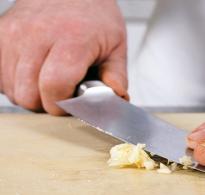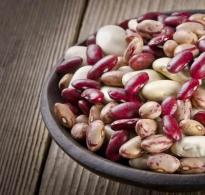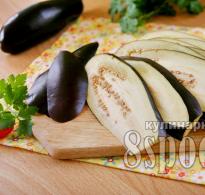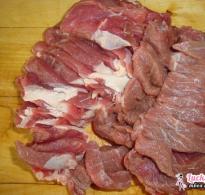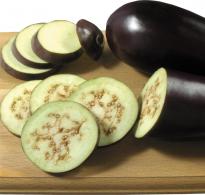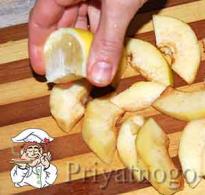Proper storage of fruits and vegetables. How to properly store vegetables and fruits
The shelf life of fruits is important factors, helping to maintain a fresh appearance and slow down the process of decay. And in a situation where the fruits have not yet ripened, you need to be able to create the right conditions so that they become ripe and reveal their taste. Read on to find out how to do this.
Temperature, timing and humidity when storing fruits
Thanks to properly selected temperature and humidity levels, fruits can be stored and consumed much longer. Try to adhere to the values in the following table.
| Fruit name | Temperature | Average humidity levels |
|---|---|---|
| Apricot | -1 to 0 °C | 93% |
| Avocado (ripe) | from +3 to +7 °C | 90% |
| Avocado (unripe) | from +7 to +10 °C | 91% |
| Quince | -1 to 0 °C | 90% |
| Pineapple | from +10 to +13 °C | 91% |
| Orange | from 0 to +2 °C | 92% |
| Watermelon | from +13 to +21 °C | from 87 to 93% |
| Banana (green) | from +17 to +21 °C | from 88 to 94% |
| Banana (ripe) | from +13 to +16 °C | 90% |
| Grape | -1 to 0 °C | 85% |
| Pomegranate | from +5 to +10 °C | from 91 to 94% |
| Grapefruit | from +13 to +16 °C | from 90 to 95% |
| Pear (green) | 0 °C | from 95 to 98% |
| Pear (southern) | from +4 to +5 °C | 95% |
| Pear (other varieties) | -2 to -1 °C | from 89 to 94% |
| Melon (ripe) | from +7 to +10 °C | 91% |
| Melon (other varieties) | from +10 to +13 °C | from 86 to 96% |
| Figs | from 0 to +2 °C | 93% |
| Kiwi | from 0 to +2 °C | from 91 to 96% |
| Kumquat | +10 °C | 90% |
| Lime | from +9 to +13 °C | from 89 to 94% |
| Lemon | from +11 to +13 °C | 93% |
| Mandarin | from +4 to +7°C | from 89 to 94% |
| Nectarine | -1 to 0 °C | 94% |
| Peach | -1 to 0 °C | from 88 to 93% |
| Pomelo | from 0 to +20 °C | 90% |
| Sweetie | from +6 to +9 °C | 90% |
| Plum | -0.5 to +1 °C | from 91 to 96% |
| Feijoa | 0 °C for unripe 24 °C for ripe |
93% |
| Fruit (sliced or salad) | from 0 to +2 °C | from 89 to 94% |
| Persimmon | from 0 to +2 °C | 94% |
| Apple | -4 to -1 °C | from 88 to 93% |
| Apple (summer varieties) | from +1 to +4 °C | 90% |
These tables refer to freshly harvested fruits collected in accordance with the necessary technologies. Humidity for the fruits described above should not fall below 85%. Next, it is worth noting the shelf life:
Some fruits produce a substance called ethylene. It accelerates ripening and adds a bitter taste to fruits that are sensitive to it, namely:

The first group should not be stored with the second.
Where and how to store?
For home storage in an apartment, a special spacious box located at the bottom of any refrigerator is suitable. It is in such boxes that the fruit will be surrounded by a large influx of moist air.
The only exceptions in this regard would be lime, banana and lemon, since when stored in places with low temperatures, they spoil much faster. Now it’s worth talking about certain features of some fruits.

Never store damaged fruits together with whole ones, as they may spoil. And if mold is found on some fruits, it is better to throw away all the rest too, since infection of healthy fruits occurs very quickly.
To prevent mold from forming, do not wash fruits before putting them in the refrigerator. However, if you do do this, be sure to dry the fruits with a paper towel.
Storage conditions for exotic fruits
Various companies engaged in the delivery of unusual tropical fruits from Thailand and Vietnam have now become very popular. It is worth taking a closer look at how to store them correctly. This is especially true for large fruit souvenir baskets, which are ordered as gifts on New Year and other holidays.
| Fruit name | Average optimum temperature | Average optimum humidity |
|---|---|---|
| Grenadilla | +8.5 °C | from 85 to 90% |
| Guava | +9°C | 93% |
| Jackfruit | +12.5 °C | 94% |
| Durian | +19 °C | 90% |
| Melon (cantaloupe or cantaloupe) | +2 °C | 93% |
| Carambola | +9 °C | 90% |
| Kiwano | +24 °C | 91% |
| Coconut | +14 °C | from 80 to 85% |
| Lychee | +6 °C | 93% |
| Longan | +7 °C | 94% |
| Mango | +10 °C | 91% |
| Mangosteen | +8 °C | from 85 to 87% |
| passion fruit | from +6 °C | 93% |
| Papaya | +12 °C | 91% |
| Pitahaya | +5.5 °C | 90% |
| Rambutan | +7 °C | 93% |
| Salak | +8 °C | 91% |
| Sapodilla | +5 °C | 92% |
| Tamarillo | +10 °C | 90% |
| Tamarind | +6 °C | from 93% |
| Cherimoya | +9.5 °C | from 85 to 95% |
Tropical fruits are more popular high temperatures and humidity. It is better not to keep them in the refrigerator, but to put them in a box or basket with a lid. But even the slightest error during transportation can speed up their ripening, which means their shelf life will decrease:
- up to 3 days: pitahaya, tamarillo;
- up to 5 days: jackfruit, durian, herring, cherimoya;
- up to 6 days: longan;
- up to 1 week: kiwano, papaya, rambutan;
- up to 10 days: grenadilla, guava;
- up to 2 weeks: melon (musk or cantaloupe), lychee, mangosteen, sapodilla;
- up to 21 days: carambola;
- up to 1.5 months: mango, passion fruit, tamarind;
- up to 2 months: coconut.
 Fresh fruits are tasty and healthy. Don't underestimate the importance temperature regime storage of fruits, since it is thanks to it that the amount of all vitamins and nutrients increases or decreases. Use the above tables and recommendations, try to store food correctly, and take care of your body. Be healthy!
Fresh fruits are tasty and healthy. Don't underestimate the importance temperature regime storage of fruits, since it is thanks to it that the amount of all vitamins and nutrients increases or decreases. Use the above tables and recommendations, try to store food correctly, and take care of your body. Be healthy!
Here are some tricks to help you store your fruits and vegetables better!
Keep vegetables away from moisture
This may seem strange, but you shouldn't wash food you brought from the store before you put it in the refrigerator or on the shelf. If something is dirty, just wipe it with a napkin or dry cloth. Washing disrupts natural protective processes. 
Fruits and vegetables love dryness
Moisture causes mold to form. In a good way A good way to avoid this is to place a paper towel inside the fruit or vegetable container. This way you will get rid of dampness and protect food from rotting. 
Store avocados correctly
Unripe avocados should be kept in a thick paper bag or simply in newspaper. The temperature should be room temperature. After ripening, it is better to put them in a plastic bag and put them in the refrigerator, where they will last longer and will not ripen further. 
Some fruits and vegetables should not be refrigerated
Bell peppers, cucumbers and tomatoes should be stored indoors. Peppers lose their texture if kept in the refrigerator, and cucumbers and tomatoes can become limp. In addition, you should not keep unripe fruits or vegetables in the refrigerator, as this will speed up the rotting process. 
Wrap banana cuttings
If bananas are stored in the refrigerator, they quickly turn black and lose their flavor. It is better to keep them somewhere in the kitchen, simply wrapping the cuttings in plastic film. 
Keep vegetable pieces in water
You can for a long time store chopped vegetables like carrots or celery in the refrigerator. To do this, you just need to place them in containers with water, it's simple and convenient. 
Keep food in a warm part of the refrigerator
The lower the temperature, the more difficult it is to preserve the flavor and freshness of fruits and vegetables. If you want to maintain the taste, keep your food in a designated compartment. If you put them on other shelves, especially close to the far wall, they will freeze and lose all their quality. 
Some varieties of vegetables and fruits should not be kept nearby
Some products cannot be placed next to each other. For example, bananas, apricots, melons, pears, plums, mangoes and tomatoes actively release ethylene after ripening. Apples, eggplants, potatoes, pumpkins, watermelons, carrots and broccoli are sensitive to ethylene, causing them to rot. Remember this feature and do not place the above groups of vegetables and fruits next to each other in order to keep them fresh longer. 
Onions and potatoes should not be kept together
If you keep potatoes near onions, they will sprout and become inedible. Always store onions separately from potatoes. 
Garlic and onions love the dark
Darkness is the best friend of garlic and onions. If you don't have a large unlit room, you can simply store food in tight paper bags with several small holes for ventilation. In this case, they can be stored even in a well-lit kitchen. 
Potatoes spoil in direct sunlight
Do not store potatoes where they are exposed to direct sunlight. The tubers will begin to rot and become dangerous. It is better to keep them dark and cool, in an open box with good air ventilation. 
Store apples with potatoes
If you put an apple with potatoes, the latter will stay fresh much longer. 
Asparagus should be stored just like a bouquet of flowers.
Hold the asparagus in a glass of water like a flower bouquet. This way it will stay fresh longer. 
Broccoli and cauliflower love moisture
Broccoli should be stored with the stem in a glass, covered with a damp towel on top. The water needs to be changed regularly. Cauliflower can also be wrapped in a towel or plastic wrap. 
Vegetables require ventilation
You should not hide vegetables in a cabinet, as this will spoil them faster. It is much better to place them in wooden or plastic boxes with ventilation. 
Wrap celery in foil
Celery will keep longer in foil and in a cool place. In plastic it loses its taste. 
Tomatoes should be stored with the cuttings facing up.
The area around the cutting is the most delicate; this is where the vegetable begins to rot. Store tomatoes with the stem facing up. 
Grapes will stay fresh longer if you keep them in a bag
A plastic bag will preserve the juiciness and freshness of the grapes. Do not store it in a large bunch: the berries at the bottom will be spoiled.
Storing vegetables and fruits
Fruits and vegetables are essential for a balanced and healthy diet. as well as grains, meats and dairy products. They give us important nutrients: vitamins, minerals and fiber. Because of not proper storage fruits and vegetables spoil quickly. In addition, vitamins are especially sensitive to temperature and light. This means that proper storage of vegetables and fruits allows you to preserve vitamins for a long time. In this article, you will discover how to store vegetables and fruits, keeping them fresh and full of healthy ingredients for a long time.
Proper storage of vegetables and fruits
Various fruits and vegetables require different conditions storage Temperature and air humidity play a particularly important role in the proper storage of vegetables and fruits, depending on their origin.
Most people store fruits and vegetables in the refrigerator without thinking twice about it. On the other hand for tropical fruits, such as bananas or melons, this is not at all suitable place. Due to the low temperature, the cells of the fruit's tissues are damaged and the bananas become covered with brown spots. It is best to store vegetables and fruits grown in southern climates at temperatures from 8 to 13 degrees.
If vegetables and fruits are stored in more cool place, they lose up to 70 percent of their vitamins after just two days. In addition to heat, vitamins are very sensitive to light. Therefore, fruits and vegetables that you do not have in the refrigerator are best stored in a dark place.
Temperature is critical
The following fruits and vegetables can be safely stored in the refrigerator:
Fruits: apricots, pears, peaches, nectarines, cherries, strawberries, blueberries, raspberries, gooseberries, currants, grapes, kiwis and plums
Vegetables: broccoli, cauliflower, carrots, kohlrabi, mushrooms, corn, leeks, lettuce, spinach, radishes, Brussels sprouts, asparagus, Chinese cabbage and green peas.
Fruit stored in the refrigerator should be placed in open plastic bags to prevent the fruit from drying out.
A little warmer - ideal temperature for storing vegetables and fruits from warm countries - 8-13 degrees.
Fruits: melon, mango, lemon, papaya, pineapple and grapefruit
Vegetables: tomatoes, sweet pepper, zucchini, cucumbers, onions, potatoes, garlic and eggplants
The easiest way to store them is in the basement or pantry. This is much better because room temperature too warm and the refrigerator too cold for long-term storage. And bananas are best stored at a temperature of 12 to 15 degrees.
How to store fruit
How to store vegetables and fruits
- Apples: Apples become wrinkled over time because they lose water. Therefore, it is better to store apples in a room with high humidity, such as a basement. Apples should never be stored with other fruits because they emit large number ethylene.
- Bananas: Bananas are not stored in the refrigerator, because there they quickly become covered with brown spots. Bananas can be stored in a cool, dry place for up to 3-4 days.
- Strawberries: Strawberries should only be stored in the refrigerator. These berries are very delicate and spoil quickly, so they can be stored for no more than two days. Strawberries should also be stored in such a way that the berries are not subjected to any pressure, otherwise you will get sweet fruit with bruises.
- Melon: Melons are best stored in a basement or cool pantry. If the melon has already been cut, it is best to store it wrapped in plastic wrap.
- Plums: Plums should be stored unwashed in the refrigerator. Thanks to the white coating that covers the plums, the fruits are protected from drying out.
- Grapes: Grapes, like plums, should also be washed immediately before eating. Otherwise, the grapes dry out faster.
- Cucumbers: Cucumbers should not be stored in the refrigerator. They remain fresh for a long time at a temperature of about 15 degrees. Therefore, it is best to store cucumbers in the basement or pantry.
- Carrots: Carrots can be stored in the refrigerator, preferably in a plastic bag with holes. The tops should be cut off. As they continue to grow, they use up water and the carrots may become wrinkled.
- Asparagus: Asparagus is best eaten as fresh as possible. Store in the refrigerator for no more than a day, wrapped in a towel.
- Tomatoes: Tomatoes are kept in the refrigerator, where they quickly rot. They should be stored in a dry, cool place. Tomatoes should never be stored together with other vegetables, as they produce large amounts of ethylene.
- Zucchini: Zucchini, like cucumbers, is very sensitive to cold. It is best to keep them in a cool, dark place.
To properly store vegetables and fruits, you should know that tomatoes and apples should not be stored together with other fruits and vegetables. It has been established that they emit ethylene in large quantities. This gas drives the ripening process and thus ensures that fruits and vegetables ripen and spoil faster. Other fruits, such as bananas or apricots, also emit ethylene, although in smaller quantities than apples and tomatoes.
If you bought an unripe fruit, you can take advantage of this effect: place an apple or tomato in an unripe fruit, and the ripening process will be accelerated.
Remember that various types vegetables such as cucumbers, cauliflower, lettuce and cabbage are very sensitive to ethylene, these fruits and vegetables should always be stored separately.
Despite all the tips on how to store vegetables and fruits, you should always keep in mind that fruits and vegetables are best enjoyed fresh. Storage of vegetables and fruits should not be too long, because even if vegetables and fruits are stored in optimal conditions, they lose valuable nutrients all the time. So buy as many fruits and vegetables as you need over the next two to three days.
Over the course of five days, we will talk about how to furnish your home, make budget repairs, sort out utility bills once and for all, and find beautiful interior items. This material will tell you how to properly store food at home.
Vegetables and fruits
All fruits and vegetables produce ethylene, a colorless gas that causes ripening. The more mature the plant, the more gas. The largest amount of ethylene is released by overripe fruits, such as a rotting tomato. If it or a banana skin is placed in a box with unripe peaches and covered, the peaches will begin to ripen faster than they would on their own outside. On an industrial scale, vegetables and fruits are placed in chambers with ethylene to speed up ripening.
Ideally, vegetables and fruits should be stored in paper bags separately from each other: paper creates insulation, including from diseases.
Plastic bags are also suitable, the main thing is to ensure that the food in them is dry. If you plan to eat vegetables and fruits within a few days, it is not necessary to keep them in the refrigerator.
Tomatoes
Whether or not to store tomatoes in the refrigerator is a controversial issue. On the one hand, when it’s cold, a tomato, like any other product, slows down metabolic processes. On the other hand, a tomato is a specific product; it quickly deteriorates in the light, and in the cold it withers due to its watery structure. Tomatoes were often dehydrated in refrigerators of the old design, but the new ones are made according to the so-called “crying type,” when moisture collects on the back wall and then flows into a special tray. Thus, the refrigerator maintains relative humidity close to 100%, versus 75% in the past. Accordingly, you can store tomatoes in such a refrigerator. The main thing is not to forget about expiration dates.
Potato
When exposed to light, potatoes, like other plants of the nightshade family (for example, eggplant, tomato and pepper), begin to turn green and at the same time produce the toxic substance solanine. It is better not to eat such potatoes or cut off the affected area. Potatoes need to be stored in a dark and cool place, at a temperature no higher than plus 2-4 degrees Celsius, otherwise they will begin to sprout. Of course, ideally, potatoes should be stored in the cellar, as they did before, but the refrigerator will also work. And it’s better if the tubers are in a paper bag.
Onions and garlic
To onions and garlic are preserved for a long time, they must be in a cool, ventilated place, otherwise they will dry out and rot, since in the heat they can be infected by a fungus.
Sauces
Sauces can be stored either in the refrigerator or on the kitchen counter. The only problem (if this is a problem at all, of course) is that they can thicken. But this does not mean that their taste or texture will be destroyed.
Honey
One of the few products that is really better not to be stored in the refrigerator. This is not a living organism, like fruits and vegetables, for example; it does not undergo biochemical processes that can or should be slowed down with the help of cold. In the refrigerator, due to the low temperature, honey will crystallize and thicken.
Green
The greens must initially be washed, including in order to separate the good ones from the spoiled ones. Next, the most important thing is to dry it thoroughly. The easiest way to do this is with a paper towel.
There are several ways to store greens, e.g. glass jar, closed with a plastic lid, or in a plastic bag with holes made in it for air to enter. In fact, the most convenient way is to wrap the greens in a damp cloth towel and put them in the refrigerator.
Tea, coffee, spices, yeast
The main task here is to limit evaporation as much as possible, and also buy these products in moderation, since they also cannot be stored forever. You can pour tea and spices into glass or tin cans, but make sure they are tightly closed.
As for the recently popular instant yeast, it needs to be stored in the freezer and warmed before use. Fresh yeast should be stored in the refrigerator according to the expiration date.
Raw meat and fish
Chilled meat can be stored in the refrigerator for no more than two to three days. If you do not initially plan to cook with meat in the near future, it should be frozen. It's better not to freeze meat big piece, but in portions, so that what is not useful during cooking does not have to be re-frozen. When meat is frozen and thawed, ice crystals change its structure; defrosting leads to loss of liquid, which leads to loss of juiciness ready-made dish. The same goes for other foods: fish, berries, vegetables, and so on.
The meat is subjected to shock freezing: its temperature drops from plus 2-4 degrees to about minus 30 in a matter of minutes. Thus, the cell walls do not have time to be destroyed by ice crystals. Subsequently, when defrosting, the loss of juiciness is minimal.
Plastic or stainless steel containers are suitable for storage.
Dairy products
Dairy products are not stored for long: for example, milk from a cow can last in the refrigerator for two days, pasteurized - six. In addition, products can turn sour faster when touched by foreign, non-sterile objects. It is better to store industrially prepared products in their original containers according to the specified period.
Canned food
Unopened canned food - fish, corn, peas, whatever - can last a long time in the refrigerator. Continue to store in the same way open canned food You can’t, they need to be placed in a tightly sealed container.
Eggs
Eggs are stored for a long time and can easily go without a refrigerator for up to a month if the shell is not damaged. So they can be stored in the refrigerator without problems, and on any shelf. Even on the one in the door, contrary to the common misconception about the dangers of the unstable temperature of this area, due to which the eggs can spoil. By the way, in modern refrigerators, all shelves have approximately the same temperature. Eggs will only spoil if they are kept warm for several weeks.
Flour, cereals and other bulk products
You can store them either in purchased packaging or in hermetically sealed containers: glass, tin, plastic. The fact is that bulk products can contain insects, for example, beetles in flour. It is difficult to fight them, but you can: sift the flour, monitor its expiration date and store it in containers with threads through which insects will definitely not get through.
Advice such as “put garlic in flour or capsicum, and there won’t be any bugs,” should be avoided: these are, of course, grandmother’s technologies, and besides, the garlic will give off a smell to the flour.
Cheese
Cheese can stay fresh for a long time if stored correctly. You cannot wrap it in plastic wrap, otherwise the cheese will not be able to breathe. Best suited parchment paper- it allows enough air to pass through and does not allow the cheese to dry out. If a variety has a strong odor, it should be kept away from other cheeses and other products. To prevent the entire refrigerator from smelling, the cheese wrapped in parchment should be placed in a tightly closed container.
Soft cheeses, such as mozzarella, should be kept in their own liquid; in addition, you need to remember that soft cheeses are stored less than solid ones.
Bread
The more fermentation the bread has undergone, the longer it will be stored. Fresh bread should be kept at room temperature in a paper or plastic bag (in the second case, the crust will lose its crunch). Storing bread in the refrigerator is not a disaster, but you still shouldn’t leave it there: in the cold, the crystallization of the starch that makes up the bread accelerates, and it goes stale faster.
In the freezer, on the contrary, bread is stored perfectly and for a long time, and this is what we are based on. industrial technologies long storage bread
Creamy, sunflower, olive
and other oils
Butter is stored according to its expiration date. It is not necessary to change the packaging, it is only important to wrap the oil tightly in it, otherwise it will go rancid.
Regarding sunflower and olive oil, then it is not recommended to store them in the refrigerator: the oil freezes and thickens. This oil should be kept in a dark place and preferably in dark glass bottles avoiding exposure to sunlight.
True, there are also oils that need to be stored in the refrigerator: flaxseed, sesame and any other freshly pressed oil, otherwise they will quickly spoil.
Mushrooms
If we talk about forest mushrooms, then this is real perishable product and in fresh Can be refrigerated for no more than two days. In this case, the mushrooms must be dry, so before placing them in the refrigerator they can only be cleaned of dirt, and washed immediately before use. If possible, mushrooms should be used immediately. Or, for example, dry or freeze.
Fast freezing is very important: The faster you freeze food, the better quality it will be.
Storing vegetables and fruits
Fruits and vegetables are essential for a balanced and healthy diet. as well as grains, meats and dairy products. They provide us with important nutrients: vitamins, minerals and fiber. Due to improper storage, fruits and vegetables quickly deteriorate. In addition, vitamins are especially sensitive to temperature and light. This means that proper storage of vegetables and fruits allows you to preserve vitamins for a long time. In this article, you will discover how to store vegetables and fruits, keeping them fresh and full of healthy ingredients for a long time.
Proper storage of vegetables and fruits
Different fruits and vegetables require different storage conditions. Temperature and air humidity play a particularly important role in the proper storage of vegetables and fruits, depending on their origin.
Most people store fruits and vegetables in the refrigerator without thinking twice about it. On the other hand, this is not a suitable place for tropical fruits such as bananas or melons. Due to the low temperature, the cells of the fruit's tissues are damaged and the bananas become covered with brown spots. It is best to store vegetables and fruits grown in southern climates at temperatures from 8 to 13 degrees.
If vegetables and fruits are stored in a cooler place, they lose up to 70 percent of their vitamins after just two days. In addition to heat, vitamins are very sensitive to light. Therefore, fruits and vegetables that you do not have in the refrigerator are best stored in a dark place.
Temperature is critical
The following fruits and vegetables can be safely stored in the refrigerator:
Fruits: apricots, pears, peaches, nectarines, cherries, strawberries, blueberries, raspberries, gooseberries, currants, grapes, kiwis and plums
Vegetables: Broccoli, cauliflower, carrots, kohlrabi, mushrooms, corn, leeks, lettuce, spinach, radishes, Brussels sprouts, asparagus, bok choy and green peas.
Fruit stored in the refrigerator should be placed in open plastic bags to prevent the fruit from drying out.
A little warmer - the ideal temperature for storing vegetables and fruits from warm countries is 8-13 degrees.
Fruits: melon, mango, lemon, papaya, pineapple and grapefruit
Vegetables: tomatoes, bell peppers, zucchini, cucumbers, onions, potatoes, garlic and eggplants
The easiest way to store them is in the basement or pantry. This is much better because room temperature is too warm and the refrigerator is too cold to store them long term. And bananas are best stored at a temperature of 12 to 15 degrees.
How to store fruit
How to store vegetables and fruits
- Apples: Apples become wrinkled over time because they lose water. Therefore, it is better to store apples in a room with high humidity, such as a basement. Apples should never be stored with other fruits because they produce large amounts of ethylene.
- Bananas: Bananas are not stored in the refrigerator, because there they quickly become covered with brown spots. Bananas can be stored in a cool, dry place for up to 3-4 days.
- Strawberries: Strawberries should only be stored in the refrigerator. These berries are very delicate and spoil quickly, so they can be stored for no more than two days. Strawberries should also be stored in such a way that the berries are not subjected to any pressure, otherwise you will end up with a sweet fruit with bruises.
- Melon: Melons are best stored in a basement or cool pantry. If the melon has already been cut, it is best to store it wrapped in plastic wrap.
- Plums: Plums should be stored unwashed in the refrigerator. Thanks to the white coating that covers the plums, the fruits are protected from drying out.
- Grapes: Grapes, like plums, should also be washed immediately before eating. Otherwise, the grapes dry out faster.
- Cucumbers: Cucumbers should not be stored in the refrigerator. They remain fresh for a long time at a temperature of about 15 degrees. Therefore, it is best to store cucumbers in the basement or pantry.
- Carrots: Carrots can be stored in the refrigerator, preferably in a plastic bag with holes. The tops should be cut off. As they continue to grow, they use up water and the carrots may become wrinkled.
- Asparagus: Asparagus is best eaten as fresh as possible. Store in the refrigerator for no more than a day, wrapped in a towel.
- Tomatoes: Tomatoes are kept in the refrigerator, where they quickly rot. They should be stored in a dry, cool place. Tomatoes should never be stored together with other vegetables, as they produce large amounts of ethylene.
- Zucchini: Zucchini, like cucumbers, is very sensitive to cold. It is best to keep them in a cool, dark place.
To properly store vegetables and fruits, you should know that tomatoes and apples should not be stored together with other fruits and vegetables. It has been established that they emit ethylene in large quantities. This gas drives the ripening process and thus ensures that fruits and vegetables ripen and spoil faster. Other fruits, such as bananas or apricots, also emit ethylene, although in smaller quantities than apples and tomatoes.
If you bought an unripe fruit, you can take advantage of this effect: place an apple or tomato in an unripe fruit, and the ripening process will be accelerated.
Remember that various types of vegetables such as cucumbers, cauliflower, lettuce and cabbage are very sensitive to ethylene, you should always store these fruits and vegetables separately.
Despite all the tips on how to store vegetables and fruits, you should always keep in mind that fruits and vegetables are best enjoyed fresh. Storage of vegetables and fruits should not be too long, because even if vegetables and fruits are stored in optimal conditions, they lose valuable nutrients all the time. So buy as many fruits and vegetables as you need over the next two to three days.

